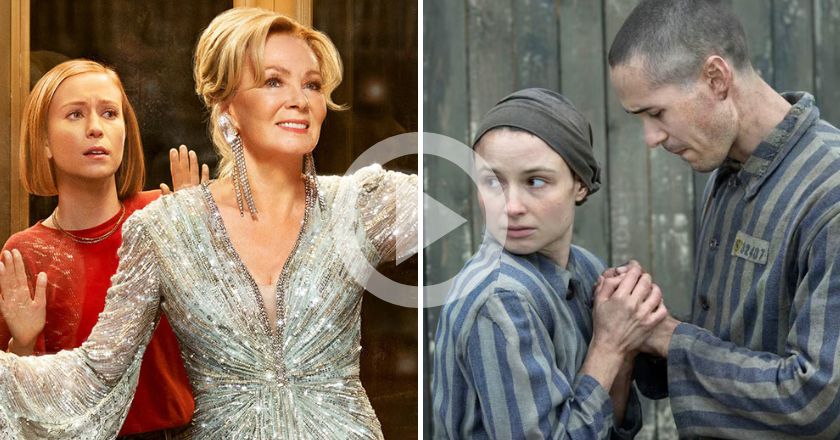
The Water Diviner marks Russell Crowe‘s directorial debut and is the latest Australian attempt at recapturing the magic of yesterday’s sweeping wartime romantics. The film shoots straight for the heart, dealing with love, loss and the uneasy reconciliation between former enemies. The characters and scope are perfect fodder for a film going for that epic-yet-personal feel, but sadly, in execution, The Water Diviner time and again makes the easiest possible choices and does nothing to invest the audience’s interest beyond its initial conceit.
Following his wife’s suicide, Australian farmer Joshua Connor (Russell Crowe) sets out to bring home the bodies of his three sons, all lost in the Battle of Gallipoli four years prior. In the wake of devastation across the Turkish shores, few are sympathetic to his need for closure, but eventually Connor finds help in his hotelkeeper Ayshe (Olga Kurylenko), Australian Lieutenant Colonel Hughes (Jai Courtney) and Turkish war hero Major Hasan (Yilmaz Erdogan). As wartime tensions fade away Connor develops a strong friendship with Hasan and learns that one of his sons may still be alive.
The best thing The Water Diviner has going for it is how fascinating a setting occupied Anatolia proves to be. Following their losses in the war, the once great Ottoman Empire is being carved up by the various European powers, mere months away from its complete collapse and the birth of the modern Republic of Turkey. Though revolution is brewing and the war rages on against the Greeks moving further into their borders, the sombre tone of defeat lingers over the Turks as they are forced to watch their 600-year-old nation come to an end. The film’s core theme of forgiveness appears in many places, but it’s here that it is illustrated most beautifully. Even having lost his three sons to the Turks, it’s inconceivable that Connor could resent them in light of all that the war had brought to these people.
Erdogan’s Hasan is perhaps the best window into the film’s thesis. The Water Diviner smartly opens on Hasan and his fellow Turks, instantly humanising the “enemy” and establishing quickly his fatherly quality. Erdogan is a calming presence, taking everything on the cheek and bringing the film’s message home with little more than his sad eyes and comforting smile. To Hasan, it’s still the same war his people have been fighting for centuries, and he bares no more hatred for the Australians than he does the countless other peoples the Ottomans have tangled with in their history.

Sadly, Hasan stands alone as the only authentic or developed character. With the possible exception of Sergeant Jamal (Cem Yilmaz), who works well as a light-hearted counterpoint to the reserved Hasan, the rest of the cast are too burdened by their archetypal roles and the heavy-handed script to be anything but brooding bores. Within moments of meeting them you will see every character’s arc played out in your mind’s eye and then have to sit there as the film crawls at a snail’s pace from trope to trope, without a single surprise to be had. Whether it’s the ham-fisted romance Connor has with Ayshe, his sickly”“sweet bonding with her fatherless son, or his tussles with the evil English bureaucracy, every thread is painfully familiar and contrived. If there is one thing holding The Water Diviner back, it’s how lazy and obvious its attempts are to elicit an emotional response.
If there’s as second, it’s Crowe.
Though perhaps less so lately, the Academy Award winning actor has plenty of great performances under his belt, but Joshua Connor is not one of them. It’s difficult to tell whether Crowe struggled directing himself or if it’s just the overwritten script, but The Water Diviner‘s tragic lead lands just on the right side of being irreparably indulgent. As a director Crowe milks every moment of the film’s groan-inducing melodrama for all it’s worth, and as an actor is utterly saccharine, spending the entirety of the film begging you to love him for being so really, really nice to everyone when he’s so really, really sad.
Despite having such fertile dramatic ground, there really isn’t much to The Water Diviner. For those with genuine interest in the history there may be something here for you beyond the weak storytelling, but I found myself annoyed that the film would rub up against such important philosophical questions about the role the west played while being too cowardly to actually explore any of them. In the end, if you do want to learn more about the final days of the Ottoman Empire, you’re probably better off just watching a documentary, and if you want something in the vain of entertainment maybe go for a film with a modicum of originality.

Subscribe to Screen Realm’s e-newsletter! Plus, be sure to join Screen Realm on Twitter, Facebook, Instagram, LinkedIn and YouTube.








